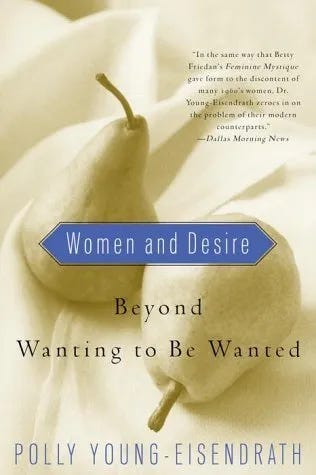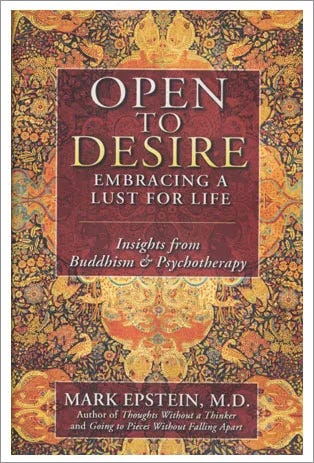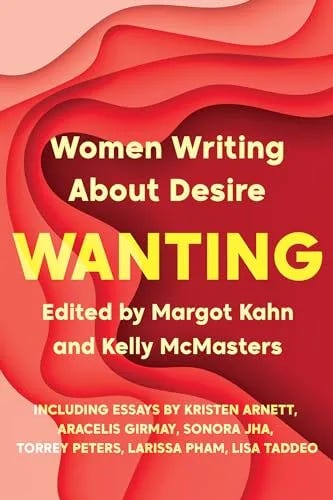Audacious Women, Creative Lives is a newsletter sharing inspiring stories of women writers and artists, as well as a community supporting and inspiring women to live bold creative lives.
To want or be wanted? That is the question.
So much of our training as women tells us that we are objects of desire rather than desiring subjects. We know this. We talk about the male gaze, the objectification of women’s bodies, the double consciousness that develops as we learn to see ourselves through others’ eyes. But knowing this doesn’t magically transform us from conflicted subject-objects into some kind of sovereign beings.
As girls we were often expected to please others, and as women we fear being selfish. We put others’ needs first, we stifle our own desires, or, worse, we forget we even have them. I’m talking here about sexual desires, sure, but also other things we want in our lives. It’s not just that we fear wanting certain things. It’s the desiring in the first place that can feel so wrong.
desire (v.): wish, want, crave, to yearn for, to have a longing for.
I thought a lot about desire as I left my old life and started a new one. Then last week I came across a response to an old post of mine. And it all came rushing back to me. The respondent had recently discovered why she was unhappy in her life: “because I’m still catering to the needs of others,” she said, “and not truly putting MY needs first because it feels selfish! Yet I crave solitude to write, to really create a life for myself on my own terms.” It broke my heart to read this, because I knew the feeling well.
This is exactly where I was when I hit rock-bottom a few years ago. And it’s a place so many of us have been. It is the age-old problem for women who desire to write, who crave the freedom of mind to imagine new lives for themselves. We stifle our own needs for solitude and subjectivity because we fear being selfish. And then one day we realize we don’t know what we want anymore.

In her book Women and Desire: Beyond Wanting to be Wanted (1999), Polly Young-Eisendrath writes in the very first sentence,
In twenty years of practicing psychoanalysis and psychotherapy, I have found that the question What do you want? produces bewilderment in most women. We often do not know or we cannot say what we desire.
There’s a great line in Deborah Levy’s Real Estate (2021) that touches on this: “You never know what a woman really wants because she’s always being told what she wants.”
Why is it so hard to want, to acknowledge our desires, and (God forbid) be frank about them? For years I had a vague yearning, for what I didn’t know. It took me a long time to figure that out, and a lot of solitude and writing. But then to start saying out loud what I wanted—that was a whole other thing.
So here goes . . . I want to live somewhere in Europe (preferably Scotland, if they will let me). I want to be a writer. I want to write an amazing novel and get it published (and it would be cool if people really liked it). I want to feel good in my own body. I want to have a passionate love life. I want to have a cozy house by the sea. I want to feel alive in every part of me.
There, I’ve said it. And it wasn’t so hard.

Desire and the Writer
How does all this discomfort with desire affect us as writers? I’ve come to think that we can’t realize our potential as writers without first recognizing and claiming our own desires. That is the beginning of everything else. And not just our desires to write, but our desires for all kinds of things. We must be subjects in our own lives, not objects in others’ lives, before we can write. Or I suppose we can write our way into subjectivity. I think that is what I’ve done.
I love what Mark Epstein, Buddhist psychologist extraordinaire, has to say in “I Want Therefore I Am”:
To be a subject, a person must be comfortable with his or her own point of view. . . . To desire is to have a personal voice, to stop being an object, to break with the conditioning of family and culture.
Voice and point of view—just what the writer needs. And we can’t have them without having our own desires. But it’s more than that. Without desire we cannot create. Desire is the first ingredient of imagination and then of willing something new into being.
Simone de Beauvoir speaks beautifully about the freedom of the creator in The Second Sex:
Art, literature, and philosophy are attempts to found the world anew on a human freedom: that of the creator; to foster such an aim, one must first unequivocally posit oneself as a freedom. . . . one must first emerge [in the world] in sovereign solitude if one wants to try to grasp it anew.
But the process of claiming “sovereign solitude,” of seeing ourselves as subjects with our own desires and wills to make them reality can feel very scary for women. (Beauvoir felt very few, if any, women had yet achieved it.) Epstein writes:
To desire is threatening to the status quo. . . . Because the conditioned self starts to break down under pressure from the desiring self, we may be afraid of naming our desire even to ourselves, afraid of allowing ourselves to desire for fear of becoming suddenly unacceptable and alone, unsure of how we will be received. Desire can seem very dangerous.
Does it feel dangerous to you? It certainly did to me.
Can We Talk About Desire?
Have you read any authors particularly good at writing about desire? I’m on the search and would love recommendations!
Has anybody read Polly Young-Eisendrath’s Women and Desire: Beyond Wanting to be Wanted? Or Mark Epstein’s book Open to Desire: Embracing the Lust for Life? Or Wanting: Women Writing About Desire, ed. by Margot Kohn and Kelly McMasters (with essays by Lisa Taddeo, Melissa Febos, and others)?



I have only dabbled in them, but they look great. If you have read them, do share your thoughts in the comments!
I would also love to hear your thoughts on women, desire, and writing in general. My posts are, more than anything, invitations to discussion. I don’t have the answers to all of my questions. That is what makes the essay form so fun and also challenging—it’s about opening to our questions, but never really reaching final conclusions. Nonetheless, I think there is a lot to say on the topic of women, writing, and desire, and I’d love to know what you think!
See you in the comments!
Anne





Thanks Anne for initiating this conversation which is obviously very timely and meaningful for many of us!!
I feel I have some different perspectives on Desire's place in our lives. Partly, because over the last 25 years, I have been able to fulfil my desire for solitude and writing, amidst the dedication to a marriage, to friendships and community and to work as an educator and writing mentor. One thing that has allowed me this has been a supportive husband who has always understood the necessity and nourishment of my writing life. However, in choosing to prioritize writing (as well as other forms of art and self-nourishment: dance, visual art, yoga, meditation), I have chosen to let go of other desires: a bigger income; owning my own home; children of my own, and annual global travel. Not that I am saying we can't have all that we desire. But I have not figured out how to have it ALL.
On that note, a business coach a number of years ago (as well as meditation teacher more recently) invited me to consider that under any desire, is a deeper desire and then under that one, an even deeper one. This has come even more sharply into focus in the last four years. Since my husband was diagnosed with Parkinson's, and I have become a caregiver, I have been challenged to discern which Desires are meant to be followed and which to be sublimated and/ or pursued in alternative ways. I have learned to look closely at what I desire and then, to consider how I can shift my perception in such a way that it allows me to experience that Desire as instantaneously fulfilled. (I wonder too, how Desire is cultivated through the social and the capitalist systems.)
Curiously, this morning, as I sat eating my breakfast, I watched a hummingbird sipping nectar from the new feeder. A feeling of elation came. Although my life looks so different than how I had planned, with much less books published by now, (I turned 57 in February), still not owning my own home, and being limited in travel due to caring for my husband. Elation and satiation. Because I have gleaned the Desires underneath the other Desires. Often simpler and more available. Such as my own generous attention, which is exactly what I have been giving myself since early this morning, (it's now almost 2pm), alone in my study, writing.
So timely, and so needed, for women to ask these questions. I think of Emily Dickinson as a sacred text and go back to her poetry often and am still astounded at her conviction, her knowing, how she protected and insisted on what she needed to write. She obviously had some privilege in terms of finances, if you can call being ruled by a controlling father into adulthood privilege, but she knew what she wanted and needed to create. And Anne--I'm there with you about Scotland. I dream of having a place for a writer's colony there, a new type of monkish cells of comfort and quiet and unfussiness where women could write and support one another. So here's to solidarity in your wish for Scotland to have you. 💜